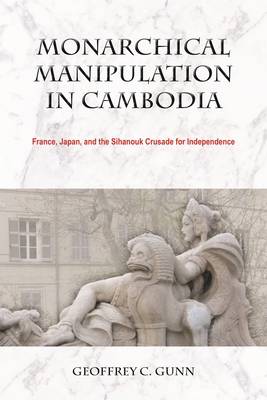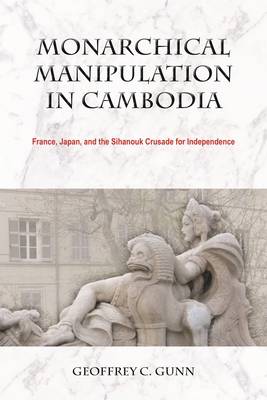
- Afhalen na 1 uur in een winkel met voorraad
- Gratis thuislevering in België vanaf € 30
- Ruim aanbod met 7 miljoen producten
- Afhalen na 1 uur in een winkel met voorraad
- Gratis thuislevering in België vanaf € 30
- Ruim aanbod met 7 miljoen producten
Zoeken
Monarchical Manipulation in Cambodia
France, Japan, and the Sihanouk Crusade for Independence
Geoffrey C Gunn
€ 105,45
+ 210 punten
Uitvoering
Omschrijving
One figure strides across modern Cambodian history--Norodom Sihanouk. From his accession to the throne of Cambodia in 1941 until his extravagant funeral ceremony in 2013, the prince turned 'king father' in later life never dodged controversy. But this is not a biography of Sihanouk; the focus is upon the final decades of the French protectorate, the rise of a counter-elite and winning of Cambodia's independence.
Manipulation of the 1,000-year-old monarchy comes to the heart of this book, as does indigenous resistance, Buddhist activism, French cultural creationism, the rise of radical republicanism, Thai recidivism and wartime Japanese machinations. Carried through into the post-war period, the seeds of Cambodia's own destruction were being sown in the jungle perimeters, rubber plantations, schools and monkhood, and even in the classrooms of prestigious French institutions. Deeply embedded Khmer cultural conventions and the interplay of charismatic power and patronage are not irrelevant to this discussion, indeed inform us as to the future and even present-day patterns of political behaviour. The skill of the young Sihanouk in navigating between Vichy France, Japanese militarists, republican opportunists, armed rural insurgency and French proconsuls is brought to life by a range of new archival documentation. A book is also a work of premonition as much inquiry, exploring how did a country of such grace and natural bounty come to be associated with the worst excesses of mass murder and genocide experienced in the twentieth century. The long political prelude as exposed in this book makes the now clichéd 'tragedy of Cambodian history' much more comprehensible.Specificaties
Betrokkenen
- Auteur(s):
- Uitgeverij:
Inhoud
- Aantal bladzijden:
- 48
- Taal:
- Engels
- Reeks:
Eigenschappen
- Productcode (EAN):
- 9788776942373
- Verschijningsdatum:
- 31/05/2018
- Uitvoering:
- Hardcover
- Formaat:
- Genaaid
- Afmetingen:
- 155 mm x 231 mm
- Gewicht:
- 879 g

Alleen bij Standaard Boekhandel
+ 210 punten op je klantenkaart van Standaard Boekhandel
Beoordelingen
We publiceren alleen reviews die voldoen aan de voorwaarden voor reviews. Bekijk onze voorwaarden voor reviews.











